|
|
|
Sort Order |
|
|
|
Items / Page
|
|
|
|
|
|
|
| Srl | Item |
| 1 |
ID:
129894
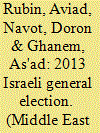

|
|
|
|
|
| Publication |
2014.
|
| Summary/Abstract |
Despite resulting in a different party configuration, the results of the 2013 Israeli general election support a similar agenda to the one set by the previous government. A year following its establishment, all indicators suggest that the current government continues to deepen neoliberal policies. Nevertheless, this election reflects two important trends: first, an ever growing discontent in Israeli public that probably would not find a solution during the tenure of the incoming government; second, lack of interest in the Israeli-Palestinian conflict that might generate negative long-term consequences.
|
|
|
|
|
|
|
|
|
|
|
|
|
|
|
|
| 2 |
ID:
105397
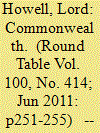

|
|
|
|
|
| Publication |
2011.
|
| Summary/Abstract |
This article, based on a lecture delivered in London, sets out why the Commonwealth is important and why it is ideally placed as a network for the future, with a unique role in the 21st century. It argues that the Commonwealth is the 'world's best soft power network'. The author sets out how the Coalition government in Britain, headed by Prime Minister David Cameron, is actively upgrading its engagement with the Commonwealth and how it is committed to putting the 'C' back into the Foreign and Commonwealth Office. The article also outlines the UK's hopes for the work of the Eminent Persons' Group, the Commonwealth Ministerial Action Group and the Perth Commonwealth Heads of Government Meeting.
|
|
|
|
|
|
|
|
|
|
|
|
|
|
|
|
| 3 |
ID:
072161
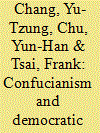

|
|
|
| 4 |
ID:
133712
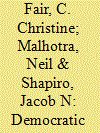

|
|
|
|
|
| Publication |
2014.
|
| Summary/Abstract |
A long-standing research tradition on political culture argues that greater support for core liberal values leads to a rejection of destructive political activities and reduced support for violent politics. In this vein, many contemporary analysts of security policy contend that a lack of democratic values in the Middle East promotes the development of violent political organizations. Unfortunately, there have been few direct tests of the hypothesis that an individual's rejection of democratic values correlates with support for militant groups. We conduct such a test in Pakistan using an original 6,000-person provincially representative survey. We find that strong supporters of democratic values are actually more supportive of militant groups and that this relationship is strongest among those who believe that Muslim rights and sovereignty are being violated in Kashmir. This is consistent with the context of Pakistani politics, where many militant groups use the principle of azadi (i.e., freedom and self-determination) to justify their actions. These results challenge the conventional wisdom about the roots of militancy and underscore the importance of understanding how local context mediates the influence of civic culture on political stability and violence.
|
|
|
|
|
|
|
|
|
|
|
|
|
|
|
|
| 5 |
ID:
105274
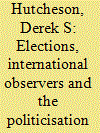

|
|
|
| 6 |
ID:
190079
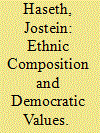

|
|
|
|
|
| Summary/Abstract |
There is a rich literature on public support for democracy. However, few have investigated the link between ethnic composition and citizens’ desire for democracy. In this study we investigate the relationship between ethnic fractionalization and democratic attitudes in 91 countries in the period 1995–2014. We test this on a measure of public desire for democracy. The main independent variables are a time-variant ethnic fractionalization index and an index of ethnic polarization, based on time-series data from the Composition of Religious Ethnic Groups project. We make use of hierarchical modeling combining country- and individual-level data in order to approach this gap in the research. The main finding is that homogeneous societies show the largest degree of desire for a democratic society within established democracies while increased fractionalization and especially increased polarization is associated with a smaller desire for democracy.
|
|
|
|
|
|
|
|
|
|
|
|
|
|
|
|
| 7 |
ID:
129452
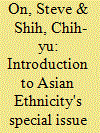

|
|
|
|
|
| Publication |
2014.
|
| Summary/Abstract |
Twenty-five years and counting, since Will Kymlicka's first book-length intervention in 1989,1 statements championing the politics of recognition and/or difference have emerged along with statements challenging the liberal accommodation of minority cultures.2 Falling under the broad description of multiculturalism, this genre of literature has gained traction in the mainstream and beyond. Today at least three specialized areas of research have been developed sometimes in opposition to and sometimes overlapping with liberal multiculturalism: feminist criticisms of multiculturalism,3 multiculturalism as antiracism, 4 and multiculturalism in Asia.5 Taking cue from, but not delimiting to, the last and burgeoning strand of multiculturalism, this special issue seeks to draw particular attention to three interrelated phenomena of ethnicities, governance, and human rights in Asia. Although these three topics have often been discussed in political science and sociology journals, rarely have they been examined in one setting. Moreover, these three issues tend to be subsumed under the broad descriptions of post-colonialism, nationalism, state-building, and development; they are largely incorporated into monograms on justice, democracy, rights, the state, culture, and equality. That is, despite their importance, the three themes have not been brought together.
|
|
|
|
|
|
|
|
|
|
|
|
|
|
|
|
| 8 |
ID:
128425
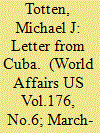

|
|
|
|
|
| Publication |
2014.
|
| Summary/Abstract |
A side from the Arab boycott against Israel, American sanctions against Cuba have lasted longer than any other embargo in the modern era. Is the US embargo against Cuba a Cold War relic or an effective tool? A recent visit suggests that the Castro regime's tyrannical imbecility still justifies continued sanctions. The sanctions were imposed in stages in the early 1960s after Fidel Castro began economic warfare against the United States by nationalizing private US property on the island. Cuban communism survived the collapse of the Soviet Union and the end of the Cold War, so in 1993 the purpose of the embargo was modified by the Cuban Democracy Act, stating that it will not be lifted unless and until the government in Havana respects the "internationally accepted standards of human rights" and "democratic values."
|
|
|
|
|
|
|
|
|
|
|
|
|
|
|
|
| 9 |
ID:
133817
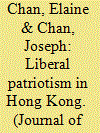

|
|
|
|
|
| Publication |
2014.
|
| Summary/Abstract |
Since Hong Kong's reunification with the People's Republic of China in 1997, debates about patriotism have erupted from time to time in Hong Kong. Considering Hong Kong's socio-political background, the feelings and attachment of Hongkongers towards their motherland are unsurprisingly complex. We therefore need a multidimensional concept to capture the complexities of Hong Kong patriotism. Based on survey data, we propose that the term 'liberal patriotism' best describes the type of patriotism in Hong Kong society, which is that love of the homeland and the state are qualified by liberal democratic values.
|
|
|
|
|
|
|
|
|
|
|
|
|
|
|
|
| 10 |
ID:
130229
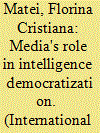

|
|
|
|
|
| Publication |
2014.
|
| Summary/Abstract |
In their path toward democratic consolidation, emerging democracies endeavor to ensure the democratic transfer of political power, bring changes in the legal framework, transform their executive, legislative, and judicial systems, boost free market economy, and develop robust and functional civil societies. They also institutionalize democratic civil-military relations (CMR) by establishing new security institutions-military, police, and intelligence agencies-that are under democratic civilian control, effective, and efficient. Of these many tasks, the democratization of intelligence agencies is by far the most daunting, as effectiveness and efficiency involve secrecy, while democratic control implies transparency, openness, and accountability. Nevertheless, democratic reform of intelligence in new democracies, though difficult, is not impossible, if and when civilians are interested and willing to "invest" in intelligence and intelligence reform. The contribution of external factors, such as media, 2 civil society, international groups, and individuals involved in human rights, may also be instrumental in achieving a balance between control and effectiveness of intelligence
|
|
|
|
|
|
|
|
|
|
|
|
|
|
|
|
| 11 |
ID:
190849
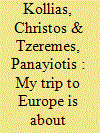

|
|
|
|
|
| Summary/Abstract |
Using President Joe Biden’s opinion article published in The Washington Post ahead of the June 14, 2021 NATO Summit as a point of departure, the present paper examines how NATO members fare in terms of the core constituent elements of liberal democracy such as civil liberties and freedom of expression. To this effect, the paper uses three indices constructed and published by the Varieties of Democracy project. The Liberal democracy, Civil liberties and Freedom of expression indices. The results from club convergence analysis that covers the post-Cold War period, indicate the presence of different convergence clubs among NATO’s member-states and Turkey as the single divergent country. Moreover, given that many NATO countries are also EU members, the paper examines the comparative effect the dual NATO and EU membership had on the democratisation process of East European countries and Turkey. The findings suggest a statistically stronger impact of EU membership vis-à-vis NATO membership.
|
|
|
|
|
|
|
|
|
|
|
|
|
|
|
|
| 12 |
ID:
123347


|
|
|
|
|
| Publication |
2013.
|
| Summary/Abstract |
Critics of global democracy have often claimed that the social and political conditions necessary for democracy to function are not met at the global level, and are unlikely to be in the foreseeable future. Such claims are usually developed with reference to national democratic institutions, and the social conditions within national democratic societies that have proved important in sustaining them. Although advocates of global democracy have contested such sceptical conclusions, they have tended to accept the method of reasoning from national to global contexts on which they are based. This article critiques this method of argument, showing that it is both highly idealised in its characterisation of national democratic practice, and overly state-centric in its assumptions about possible institutional forms that global democracy might take. We suggest that if aspiring global democrats - and their critics - are to derive useful lessons from social struggles to create and sustain democracy within nation states, a less idealised and institutionally prescriptive approach to drawing global lessons from national experience is required. We illustrate one possible such approach with reference to cases from both national and global levels, in which imperfect yet meaningful democratic practices have survived under highly inhospitable - and widely varying - conditions.
|
|
|
|
|
|
|
|
|
|
|
|
|
|
|
|
| 13 |
ID:
127837
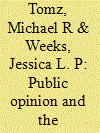

|
|
|
|
|
| Publication |
2013.
|
| Summary/Abstract |
One of the most striking findings in political science is the democratic peace: the absence of war between democracies. Some authors attempt to explain this phenomenon by highlighting the role of public opinion. They observe that democratic leaders are beholden to voters and argue that voters oppose war because of its human and financial costs. This logic predicts that democracies should behave peacefully in general, but history shows that democracies avoid war primarily in their relations with other democracies. In this article we investigate not whether democratic publics are averse to war in general, but whether they are especially reluctant to fight other democracies. We embedded experiments in public opinion polls in the United States and the United Kingdom and found that individuals are substantially less supportive of military strikes against democracies than against otherwise identical autocracies. Moreover, our experiments suggest that shared democracy pacifies the public primarily by changing perceptions of threat and morality, not by raising expectations of costs or failure. These findings shed light on a debate of enduring importance to scholars and policy makers.
|
|
|
|
|
|
|
|
|
|
|
|
|
|
|
|
| 14 |
ID:
187425
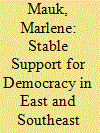

|
|
|
|
|
| Summary/Abstract |
Recent democratic regressions and crises suggest democracy is at risk across East and Southeast Asia. One of the factors that can determine democratic stability are citizens’ attitudes. While previous research has concentrated on support for democracy-in-principle, this contribution argues that it is political trust, i.e. support for democracy-in-practice, which is crucial for democratic stability. For democracies to be stable, political trust should be high as well as rooted in long-term factors like liberal democratic value orientations or social trust to protect it from short-term fluctuations following economic crises or political scandals. This contribution therefore examines not only the current levels and development of political trust but also whether it is influenced more by long-term factors (liberal democratic value orientations, social trust) or short-term factors (economic performance evaluations, incumbent support). The empirical analysis shows political trust in five East and Southeast Asian democracies (Indonesia, Japan, Mongolia, South Korea, Taiwan) to be mostly mediocre and primarily dependent on economic performance evaluations and incumbent support. Among the five democracies, citizens in Japan appear most resilient to democratic regressions; on the other hand, Taiwanese democracy seems least equipped to master future crises.
|
|
|
|
|
|
|
|
|
|
|
|
|
|
|
|
| 15 |
ID:
130250
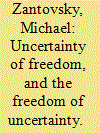

|
|
|
|
|
| Publication |
2014.
|
| Summary/Abstract |
It likely has occurred to everyone at least once that it would be a wonderful thing to win the lottery. And many of us have indeed bought a lottery ticket at least once in our lives, only to validate the well-known fact that the chances of winning in a lottery are rather small. Some of us, though, may have not put up with this sober conclusion and proceeded on the assumption that if we bought two tickets our chances of winning the lottery would increase twofold, and then perhaps extrapolated the logic to three, five, or even ten tickets. And a few of us might have even entertained the theoretical possibility that if we bought all the tickets we would be assured of winning the lottery. There is nothing wrong with dreaming of a stroke of luck and trying to maximize one's chances. But it also pays to use common sense and elementary knowledge of the probability calculus. Buying all the lottery tickets will not only give you an absolute certainty of winning but also an absolute certainty of losing vast amounts of money in the process.
But what, one may ask, does buying a lottery ticket have to do with freedom? Freedom, after all, is arguably not an outcome of a random process like winning in a lottery. It is a conscious choice to believe that men are born with certain inalienable rights and should be thus free to make decisions about their lives. Based on this belief, we build the institutions of a free society, provide them with the necessary checks and balances, and guarantee the rule of law to prevent arbitrary punishment and thwart attempts to hijack our freedom. For all the problems of a free society, we believe with Winston Churchill that democracy, the political system that embodies, maintains, and administers a free society, is vastly preferable to all the alternatives. Living in a democracy, we believe that we have hit the jackpot in the lottery of political systems.
|
|
|
|
|
|
|
|
|
|
|
|
|
|
|
|
|
|
|
|
|